| Listing 1 - 9 of 9 |
Sort by
|
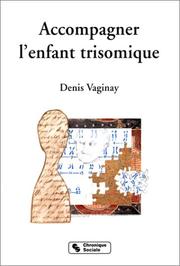
ISBN: 285008302X Year: 2006 Publisher: Lyon : Chronique Sociale,
Abstract | Keywords | Export | Availability | Bookmark
 Loading...
Loading...Choose an application
- Reference Manager
- EndNote
- RefWorks (Direct export to RefWorks)
Down syndrome. --- Down syndrome --- Down, Syndrome de --- Mongoliens --- Patients --- Rehabilitation. --- Intégration
Book
ISBN: 9782362350498 2362350495 Year: 2013 Publisher: Isbergues : Ortho édition,
Abstract | Keywords | Export | Availability | Bookmark
 Loading...
Loading...Choose an application
- Reference Manager
- EndNote
- RefWorks (Direct export to RefWorks)
Language disorders --- Down syndrome. --- Speech therapy --- Troubles du langage --- Down, Syndrome de --- Orthophonie
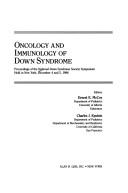
ISBN: 0845150960 9780845150962 Year: 1987 Publisher: New York (N.Y.): Liss,
Abstract | Keywords | Export | Availability | Bookmark
 Loading...
Loading...Choose an application
- Reference Manager
- EndNote
- RefWorks (Direct export to RefWorks)
Down (Syndroom van). Verwikkelingen. (Congres) --- Leucaemie. (Congres) --- Immunodeficientië. (Congres) --- Down (Syndrome de). Complications. (Congrès) --- Down (Syndrome de). Séquelles. (Congrès) --- Leucémie. (Congrès) --- Immunodéficience. (Congrès) --- Down (Syndroom van). Gevolgen. (Congres) --- Down syndrome --- Leukemia --- Immunological deficiency syndromes --- Down Syndrome
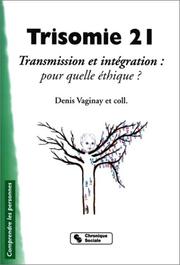
ISBN: 2850083909 Year: 2000 Publisher: Lyon : Chronique sociale,
Abstract | Keywords | Export | Availability | Bookmark
 Loading...
Loading...Choose an application
- Reference Manager
- EndNote
- RefWorks (Direct export to RefWorks)
La trisomie est une différence qui vient brutalement contrarier l’attente des parents. Comme le dit avec un réel humour attendri cette maman évoquant son fils trisomique: «en attendant Victor, je voulais qu’il soit exceptionnel! J’ai été servie!». Enfant exceptionnel échappé de l’enchaînement des générations, l’enfant trisomique est renvoyé à la marge des représentations culturelles. Le mouvement premier à son égard est celui du rejet, sinon par ses parents, du moins par la société. Multiples sont les projets plus ou moins explicites visant la disparition des trisomiques, plutôt que leur prise en compte. Par leur présence, ces enfants interrogent nos fragiles certitudes. Le contexte actuel est paradoxal: progrès et respect de la différence accompagnent curieusement la montée de l’intolérance et d’un certain eugénisme.Grâce aux progrès de la médecine et des moyens d’accompagnement, les trisomiques ont développé des capacités jusqu’alors insoupçonnées. Ils montrent une aptitude au développement en constante évolution. Ces avancées s’accompagnent toujours d’un fort investissement des parents et des professionnels. Le risque est parfois d’oublier que l’on s’adresse à des sujets. Comment faire en sorte que les personnes trisomiques ne se construisent pas uniquement pour et dans le désir de l’autre? C’est toute l’actualité de la question posée par la différence et abordée dans cet ouvrage.La culture reste silencieuse sur le handicap mental et plus encore la réflexion philosophique. Nous chercherons les raisons de ce silence tout au long de ces pages. Le travail présenté ici contribue à l'élaboration d'une pensée sur cette question, et vis à permettre une prise en compte globale, et notamment éthique, de la fragilité humaine. La culture reste silencieuse sur le handicap mental et plus encore la réflexion philosophique. Nous chercherons les raisons de ce silence tout au long de ces pages. Le travail présenté ici contribue à l’élaboration d’une pensée sur cette question, et vise à permettre une prise en compte globale, et notamment éthique, de la fragilité humaine.
Down syndrome --- Down, Syndrome de --- Mongoliens --- Patients --- Rehabilitation --- Intégration --- handicap --- trisomie 21 --- mentaal gehandicapten --- ethiek (ethische aspecten) --- handicapés mentaux --- ethique (aspects ethiques) --- Intégration --- Down syndrome. --- Rehabilitation.
Book
ISBN: 0124620027 Year: 1992 Volume: 2. Publisher: San Diego ; New York ; Boston : Academic Press,
Abstract | Keywords | Export | Availability | Bookmark
 Loading...
Loading...Choose an application
- Reference Manager
- EndNote
- RefWorks (Direct export to RefWorks)
Biochemical genetics --- Medical genetics --- Molecular biology --- Down syndrome. --- Génétique biochimique --- Génétique médicale --- Biologie moléculaire --- Down, Syndrome de
Book
ISBN: 2870091168 9782870091166 Year: 1979 Volume: 82 Publisher: Bruxelles: Mardaga,
Abstract | Keywords | Export | Availability | Bookmark
 Loading...
Loading...Choose an application
- Reference Manager
- EndNote
- RefWorks (Direct export to RefWorks)
21 trisomy --- Acromicria [Congenital ] --- Congenital acromicria --- Down syndrome --- Down's syndrome --- Down-syndroom --- Enfants --- Kinderen --- Mongolism --- Mongolism (Disease) --- Mongolisme --- Ontwikkelingspsychologie --- Psychologie du développement --- Syndrome de Down --- Trisomie 21 --- Trisomy 21 --- Down, Syndrome de --- Down Syndrome --- Down syndrome. --- Psychiatry --- Human genetics --- Paediatrics
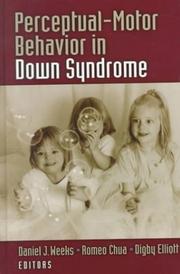
ISBN: 0880119756 9780880119757 Year: 2000 Publisher: Leeds Human Kinetics
Abstract | Keywords | Export | Availability | Bookmark
 Loading...
Loading...Choose an application
- Reference Manager
- EndNote
- RefWorks (Direct export to RefWorks)
Perceptual-Motor Behavior in Down Syndrome is a comprehensive collection of contemporary research and provides readers a window into the behavioral variability exhibited by this special group. Now you can apply this research to circumvent, or at least minimize, some of the general and specific processing challenges associated with Down syndrome. Internationally recognized contributors from 10 different countries cover aspects of sensory, cognitive, and movement processes in infants, children, and adults with Down syndrome. Specifically addressed are the differences and similarities among persons with Down syndrome, people with other disabilities, and non-disabled people. Contributors present fellow researchers, educators, parents, and students with an increased understanding that perceptual-motor behavior in Down syndrome is often adaptive and appropriate. Use this up-to-date resource in current program planning, educational initiatives, and future research efforts. (Bron: covertekst)
Down syndrome. --- Perceptual-motor processes --- Perception --- Down Syndrome --- Down, Syndrome de --- Processus perceptivomoteurs --- Perceptual-motor processes. --- 032444.jpg --- Down-syndroom --- Mongolen: motoriek --- Down syndrome --- Sensory-motor processes --- Movement, Psychology of --- 21 trisomy --- Down's syndrome --- Mongolism --- Mongolism (Disease) --- Trisomy 21 --- Human chromosome abnormalities --- Intellectual disability --- Syndromes --- Human chromosome 21 --- Perception. --- Down Syndrome.
Book
ISSN: 02212463 ISBN: 9782294703768 2294703766 Year: 2008 Volume: 24 Publisher: Issy-les-Moulineaux: Elsevier,
Abstract | Keywords | Export | Availability | Bookmark
 Loading...
Loading...Choose an application
- Reference Manager
- EndNote
- RefWorks (Direct export to RefWorks)
Down Syndrome --- Down syndrome --- Down, Syndrome de --- Mongoliens --- rehabilitation --- psychology --- congresses --- Congresses --- Patients --- Psychology --- Rehabilitation --- Congrès --- Psychologie --- Intégration --- Mental Disorders Diagnosed in Childhood --- Trisomy --- Communication Disorders --- Congrès --- Intégration --- Congresses. --- Psychology. --- Rehabilitation. --- rehabilitation. --- psychology. --- congresses. --- Syndrome de Down --- Enfant --- Communication --- Audition --- Adaptation scolaire --- trouble --- Trisomie 21. --- Trisomiques 21. --- Down syndrome. --- Réadaptation
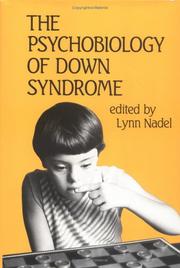
ISBN: 0262140438 0262315971 9780262315975 9780262140430 Year: 1988 Publisher: Cambridge: MIT Press,
Abstract | Keywords | Export | Availability | Bookmark
 Loading...
Loading...Choose an application
- Reference Manager
- EndNote
- RefWorks (Direct export to RefWorks)
This book covers recent research with neurobiological and cognitive features of Down syndrome. This book covers recent research with neurobiological and cognitive features of Down syndrome. There has been notable progress in understanding the psychobiological concomitants of Down syndrome. New data have pinpointed selective neurological defects, and recent research has revealed that it is possible to work with the supposedly intractable, irreversible deficits accompanying Down syndrome. Surprising improvements in cognitive functions, including language, can be shown by children and even adolescents. The topics include: early concept learning in infants with Down syndrome (Jennifer Wishart); the emergence of language skills (Lars Smith), early lexical development (Caroline Mervis), and developmental asynchrony of language development in Down syndrome (Jon Miller); the use of computers with speech output to promote language use (Laura Meyers); differences between Down syndrome and normally developing children in the use of a number concept (Rochel Gelman); the neuropsychological status of older Down syndrome individuals (Krystyna Wisniewski); neuropathological (Thomas Kemper), psychobiological (Siegfried Peuschel), and neurophysiological (Eric Courchesne) aspects of Down syndrome; and the relation between Down syndrome and Alzheimer's disease (Michael Thase). The Psychobiology of Down Syndrome is included in the series Issues in the Biology of Language and Cognition, edited by John C. Marshall, and is sponsored by the National Down Syndrome Society. A Bradford Book.
Psychobiology --- -Down syndrome --- -Congresses --- Congresses --- Patients --- -Language --- -Longitudinal studies --- -21 trisomy --- Down's syndrome --- Mongolism --- Mongolism (Disease) --- Trisomy 21 --- Human chromosome abnormalities --- Mental retardation --- Syndromes --- Human chromosome 21 --- Biological psychology --- Biopsychology --- Biology --- Human behavior --- Psychology --- Biological psychiatry --- Down syndrome --- Longitudinal studies --- Language --- Down Syndrome --- Language development --- Down, Syndrome de --- Mongoliens --- Psychobiologie --- psychology --- congresses. --- Congresses. --- Congrès --- Langage --- Etudes longitudinales --- Language Development --- 21 trisomy --- Intellectual disability --- Patients&delete& --- Language&delete& --- Longitudinal studies&delete& --- Down syndrome - Congresses --- Down syndrome - Patients - Longitudinal studies - Congresses --- Psychobiology - Congresses --- Down syndrome - Patients - Language - Congresses --- COGNITIVE SCIENCES/General --- BIOMEDICAL SCIENCES/General
| Listing 1 - 9 of 9 |
Sort by
|

 Search
Search Feedback
Feedback About UniCat
About UniCat  Help
Help News
News